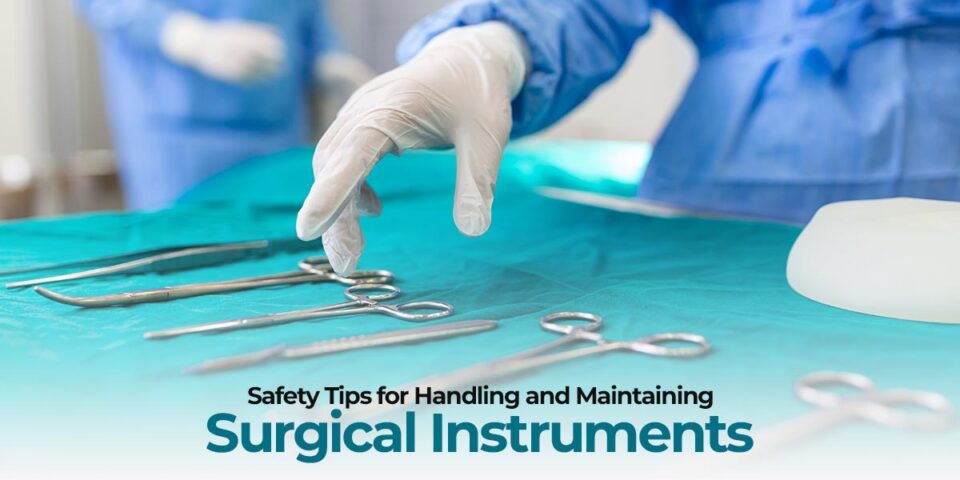Safety Tips for Handling and Maintaining Surgical Instruments
Surgical instruments form the backbone of effective medical practice. Proper handling and maintenance of the same are a very important determinant in ensuring safety and longevity. As leading surgical instrument manufacturers in Chennai, R.L. Hansraj & Co. feels that safety handling and maintenance are vital for surgical tools. Some critical tips in relation to handling surgical instruments in safety and functional performance are mentioned here.
1. Good Handling Of Operating Room Instruments
Surgical instruments should be handled diligently to avoid breakdown and maintain good functionality.
- Use them gently: Never throw a surgical instrument back into the trolley or disposed of in whatever careless manner to avoid bending them, chipping, or a host of breakdowns.
- Use the Appropriate Instrument for the Job: The wrong usage of instruments meant for other jobs could permanently damage surgical instruments. This can be exemplified in the fact that using tender scissors to cut tough materials misaligns blades.
- Avoid Using Harsh Cleaning Chemicals: Some cleaning solvents or reagents can chemically react or break down some materials used for making surgical tools. Use cleaning solutions only accepted for medical devices.
2. Sterilization And Cleaning Standards
Basic steps in infection control include ensuring that the instruments are clean and sterile.
- Pre-Cleaning: Instruments should be rinsed with distilled water immediately after use to remove blood, tissue, and other debris. This will prevent the drying and hardening of contaminants, which can be difficult to remove later.
- Manual Cleaning: Soft brushes and mild detergents should be used to clean instruments. Hinges, serrations, and other intricate parts should be given special attention since these are areas where debris tends to accumulate.
- Ultrasound Cleaning: Ultrasonic cleaning is very effective with even the smallest recesses inaccessible for cleansing. It dislodges microscopic residue without causing mechanical damage.
- Sterilization: Sterilize according to the manufacturer’s recommendations whether it is an autoclave, gas sterilized or using chemical sterilizing agents. Dry instruments to avoid corrosion before they are sterilised.
3. Inspection And Maintenance
Proper inspection and maintenance will guarantee long life and consistency in surgical instruments.
- Routine Checks: Check instruments for wear and tear, like cracks, dull edges, or misplaced parts. Any instrument with a lot of damage should be serviced or changed.
- Lubrication: Hinged instruments such as scissors and forceps should be lubricated on a regular basis to keep them moving freely without rusting. Use medical-grade, water-soluble lubricants.
- Storage: Keep instruments in a clean, dry, and organized environment. Utilize instrument trays or racks to prevent contact between tools, which may scratch or otherwise damage the instrument.
4. Training And Education
Proper training of the health care personnel is essential for the integrity of the surgical instruments.
- Staff Training: All the staff members dealing with surgical instruments must be trained about proper cleaning, sterilization, and storage.
- Guidelines Compliance: Observe national and international standards, such as those of the World Health Organization (WHO) or the Association for the Advancement of Medical Instrumentation (AAMI).
5. Partnering With Reliable Manufacturers
The quality of surgical instruments is a significant factor in their performance and durability.
R.L. Hansraj & Co. has decades of experience in manufacturing high-quality medical tools for surgery. Each instrument is manufactured to the highest quality standards. Choosing a reliable manufacturer allows healthcare facilities to rely on the durability and precision of their instruments, reducing the risk of complications during procedures.
Proper handling and proper maintenance of the surgical instruments result in safe as well as efficient patient care delivery. By employing these safety considerations, healthcare personnel can ensure longer service life to their instruments with the highest potential of surgical competence.
R.L. Hansraj & Co. committed to providing top quality surgical equipment to the health industry, supported by professional expertise to make you more confident about being the perfect associate for precision and safety in every procedure.

